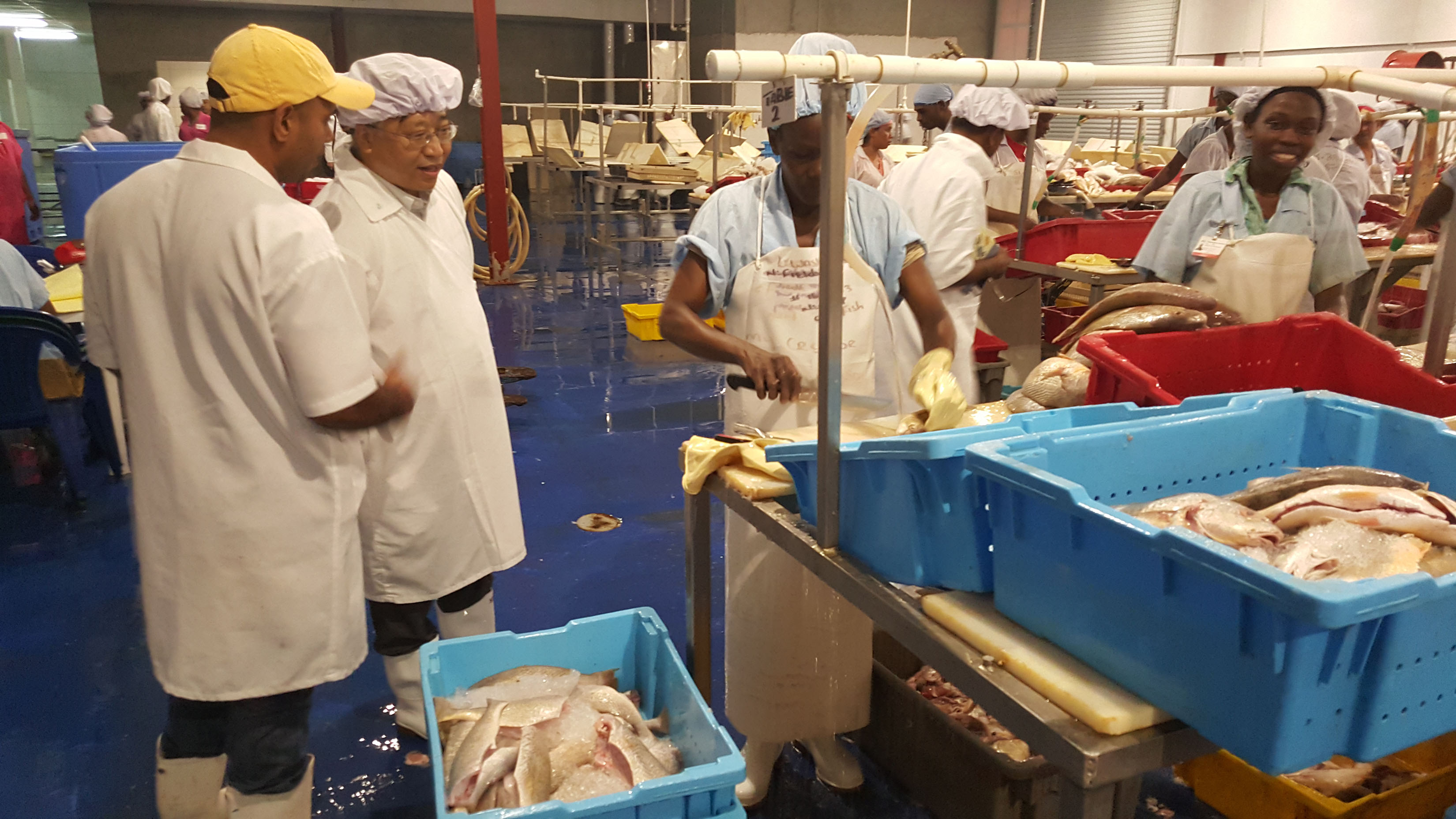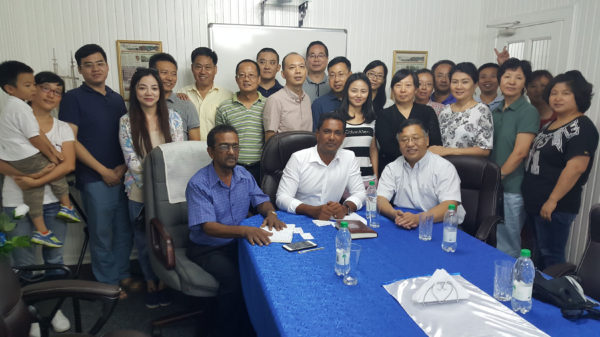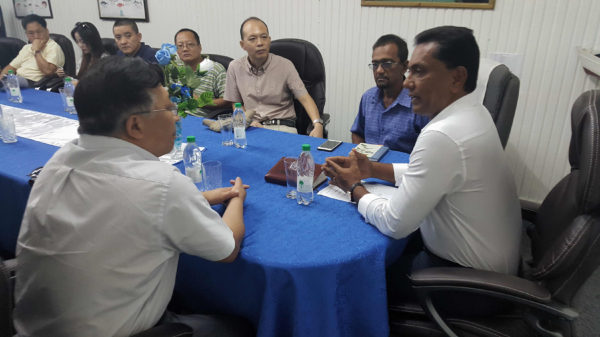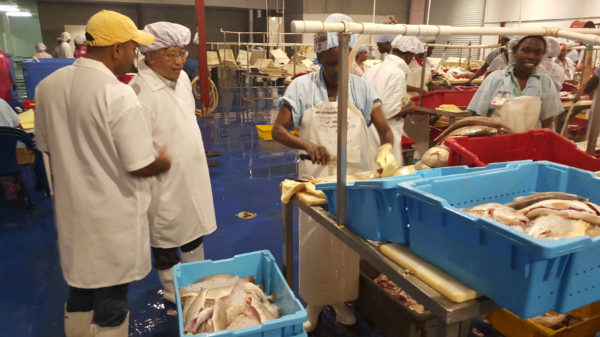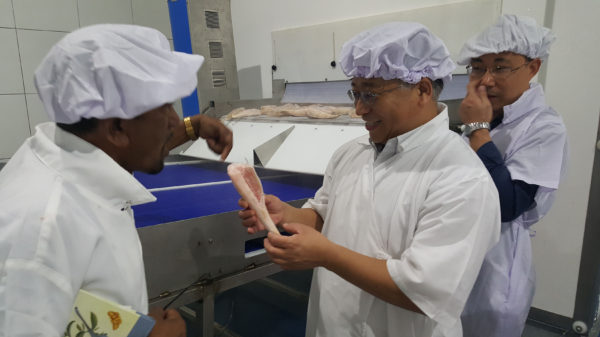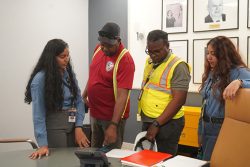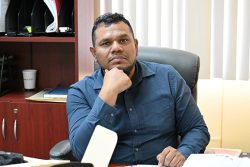Chinese Ambassador to Guyana, Cui Jianchun says he is impressed with the operations of the state-of-the-art seafood plant and the tuna factory at Pritipaul Singh Investment Inc. (PSI) following a tour to both locations on Wednesday.
The Ambassador was part of a high-level team that was invited to visit the PSI after he had indicated his willingness to provide technical assistance to the fisheries industry.
He felt honoured to be invited to the “very successful company” and told Stabroek News in an invited comment, “this is the first time I have visited the seafood manufacturing plant and it has really impressed me a lot.”
He was happy to be able to have firsthand knowledge of how the shrimp and fish are being processed and thanked Singh for affording him the opportunity.
The Ambassador made the commitment recently to assist the industry when he paid a courtesy call on Minister of Agriculture (MoA), Noel Holder.
Minister Holder had expressed appreciation for the strengthened relations that exist between China and Guyana, as well as the entire Caribbean.
Counselor and Deputy Chief of Mission, Yang Chengi had extended an invitation to the MoA to participate in China’s International Horticulture event which will run from April to October 2019 in Beijing, China.
Chief Executive Officer (CEO) of PSI, Pritipaul Singh said after reading in the press about the Ambassador’s willingness to assist the industry, he felt it was fitting to invite him for dialogue and a tour of the fish and shrimp processing plants at Mc Doom, East Bank Demerara (EBD).
The team also toured the tuna factory that Singh established at Providence, EBD more than six months ago.
Chengi, together with Jianchun also extended an invitation to Singh for his company to visit China and observe how the seafood industry works there and the businessman has promised to take up the offer.
The “technical co-operation” that the Ambassador promised the MoA, includes training that Chinese experts can come to Guyana to conduct.
He has recognized that there is great demand for training and noted that in the past, they have sent Guyanese for courses in China.
The Ambassador hopes that if an agreement is reached with the GoG for the training to take place that the PSI would be involved. Singh welcomes the idea and said it would help his company to be competitive and productive.
Jiachung has confidence that if Singh can expand his business in China and find partners, he can benefit from a huge market.
He said the “two sides can co-operate, not only for the expansion of the market, but China can give some incentives to the business people for the employment and the investment.”
Regarding opening up markets, he told this newspaper: “It really is time for me to speak to my colleagues about how they can increase the trade amount. It is also a good opportunity in technology and for investment.”
He pointed out that the purpose of his visit to the PSI was “to try to bring the companies together and work together and I really hope that China’s business people and PSI can do business in China.”
Singh said the visit was a “timely one because my company is right now in the stage of modernization and expansion.”
He hopes the Ambassador would give great guidance to PSI for marketing as well as machinery that would help to boost the “processing in whatever area we can have.”
He also said that “through the collaboration with business ventures, markets and whatever is possible, we’d work closely together with the Ambassador to ensure that they can foster this relationship for the betterment and growth of PSI…”
His company currently sells to one company in China, but said “we need to divert, we have shrimp, we have tuna and different other species of fish.”
He is looking to source markets from the “different provinces where we can take up our products and develop a good relationship… We are looking forward to a great co-operation and bilateral arrangements…”
Jianchun believes that PSI can find leading Chinese companies that would be interested in the market because “people in China love fish.”
“The Chinese market is huge and there are the professional companies that are doing processing as well but I think there will be opportunities of bilateral co-operation.”
As the Chinese Ambassador to Guyana, he has fulfilled the responsibility to facilitate the business people to have co-operation in the coming years.
China and Guyana politically speaking, he said, have no problem and the tour has given him the “chance to learn something.”
Assistant Managing Director of PSI, Vishnu Panday said it was an “historic day” as it was the first time they have had a very high official from China visiting our plant.”
Panday said too that they are “looking to go towards greater technological input in the production stream.”
He added: “By doing so we can be able to facilitate our product in the China market, which is large, as well as in other parts of the world. We want to expand to ensure that our business becomes and remains highly successful.”
The visit by the Ambassador and team is one where intentions are clearly signified about the direction in which they want to go. That direction, he added, is purely a technological one.
Chengi commented that PSI has the “capacity for production and yes we look forward for future co-operation.
Singh took up the challenge to undertake the US$15M tuna venture, which requires special techniques. At the moment, he catches Yellowfin or Bigeye tuna, which is a delicacy especially in raw preparations such as ceviche, tartare or in a sushi roll. The catch is for the export market but there are also plans to sell the tuna locally.
As the largest seafood company in Guyana, PSI generates its own water through a well it has established as well as its own power supply.
Singh who came from humble beginnings, became a successful entrepreneur after purchasing the processing plant at Mc Doom from the GoG in 1999. The operations at Providence and McDoom provide employment for over 1500 workers.
